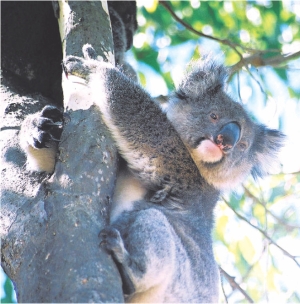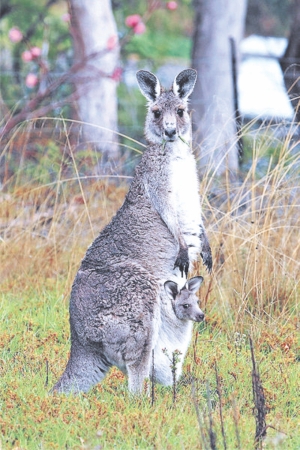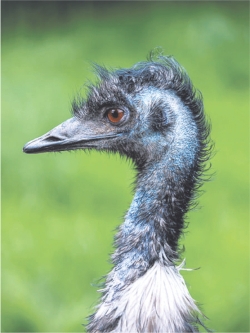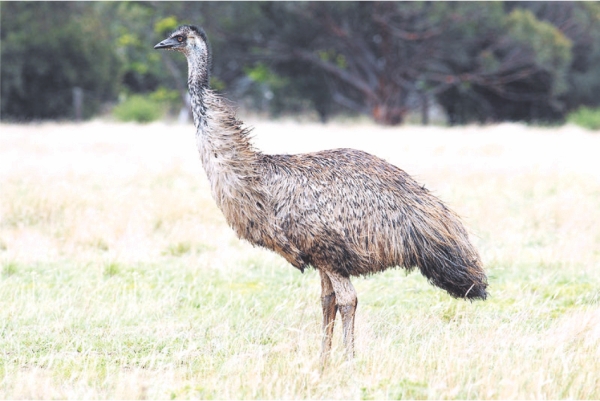| Home - Back Issues - The Team - Contact Us |
 |
| Volume 11 |Issue 25| June 22, 2012 | |
|
|
Travel
The Adventure Gene Andrew Eagle
The six-year-old was crying. He was sitting on the tan carpet with the cow-pattern texture to it, in the shadowy room at the end of the hallway. There was a window but the mulberry tree outside and the roof of the neighbours' metallic carport took away most of the sunlight. His bedroom curtains were brown with pictures of African animals on them. In front of him was a black suitcase with cheap aluminium latches. The six-year-old cried because he was going away and in what had been his school bag were the bare essential supplies. There was no despair. There was nothing wrong with his life; there'd been no argument or untoward incident. He was crying from pre-missing his family. He'd decided to move into the dry grasslands and eucalypt forests of the extinct volcanic Warrumbungle Mountains, to live with the kangaroos. It was usual after setting up the campsite that Dad would be busy with collecting scraps of wood to stoke a fire and boil a billy for tea, or would be unpacking the esky, piling bread and a tub of butter on the boot of the Kingswood to make sandwiches. His brothers and sister might be climbing the hill across the rocky stream that was lined with casuarina trees. Dad never paid much attention. He must've worried as he waited for the six-year-old to find his way back to the campsite from a nearby walk but he never said anything. He never stifled his children's sense of adventure because he always wanted them to be independent and confident. On the hill across the casuarina creek the older ones had found a small cave and there were many six-year-old questions about it: how deep it was and what it was like inside. The middle brother said the six-year-old alone wouldn't be able to get there, but offered to take him later.
But it wasn't usually the hill that craved attention. It was the nearer grasslands. Through the grasses was a whole network of tracks. Together they made a kind of cow-pattern across the landscape, diverging and joining, dipping down to meet the mostly dry stream beds where the stinging nettles grew. It was in that terrain he would see the kangaroos. In truth he never went very far but when measured in six-year-old steps distances are a good deal further and there were always animals to see. It wasn't only the kangaroo mobs resting under a tree, getting up slowly and hopping lightly away. There were emus, sometimes with a clutch of brown striped chicks at their feet. The emus had eyes like teachers when they scanned the classroom from their desks to see who was talking out of turn. They are intellectual birds except for when they run and their feather skirts sway about like a car wash machine. The country was full of rabbits and many a burrow entrance was inspected with the hope one would come out. More occasionally it'd be their enemy, the fox, scurrying away from sight; and there were rarer animals including wombats and once, high in a gum tree, a koala. That trail network never seemed to finish and finding out exactly where each leg diverged and re-emerged was exacting work. The further the six-year-old went the more he'd discover there was to discover, like the secret valley far down on the left side where there was the greenery of a few ferns to keep things looking cooler. Being alone never worried him because he never was alone. There were the roos, emus, rabbits and foxes at the least. He knew there were snakes: red-bellies, yellow-bellies and king browns; he'd heard how his oldest brother had once stepped on a red-belly and had to be rushed to hospital. But he never actually saw a snake. It was indeed not the animals but the plants that it seemed important to be wary of, because of the nettles. He'd been stung and it was painful. Despite the nettles being pointed out to him by his brother so that he'd learnt to recognise them, sometimes from thinking about the roos and their society he'd forget. But he knew, his second brother had done it for a bee sting once, that if he could find some bracken fern it was possible to pull it out of the ground and rub its roots on the sting site. His second brother had made that up of course but it had made him feel slightly better. It wasn't a plan without practicality. For a start, the roos were rather shy and it'd take time to properly make acquaintance with them; he'd have to learn their language and routines. But once they trusted him he could pat them and feel the softness of kangaroo fur. Even as they slept under the tree he could have his head on one for a pillow. They wouldn't mind.
After some time he'd know how to communicate in emu, rabbit and fox too. The nettles would be no problem because, if ever there was an accidental encounter, he'd know precisely where the bracken ferns grew. He'd know too where that cave was that his brothers had found on the hill. Perhaps there were bats that lived inside. He'd thought of water. He'd have to learn to drink from the streams and truth is it'd happened anyway. His oldest brother had taught him to cup his hands and hold them under a part of the stream that had a flow to it. The water that flowed was cleaner. He'd thought of food. It'd take time to adjust but the roos would show him which grasses to eat; and in light of the transition period he'd asked Mum to make a few sandwiches. The bag of sandwiches was one of the items in his suitcase. She didn't imagine those sandwiches were for the time before he ate only leaves and grass. Most of the rest of the space in the suitcase had been allotted to his stuffed toys. In particular there'd be no leaving the dog called Boowy that'd been a present for his third Christmas behind. Although all his toys were coming, he cried thinking of how he'd miss his human family. Boowy would miss them too. Yet when he thought about his life ahead with the roos he felt excited. It was a dilemma. Dad was already busy loading the car for the six hour, five hundred kilometre drive from Sydney to Coonabarabran where his grandmother lived. They would stay the first night there. The six-year-old knew not to say anything. He wouldn't be allowed to stay living with the kangaroos, it was certain. So he was ready to dry his eyes and pretend everything was normal when he was called to the Kingswood parked in the driveway. He only wondered if he would take up his new life before or after the family hiked the Bread Knife trail that wound its way up into the peaks of the extinct volcanoes. It would take the whole day and he'd probably ride on Dad's shoulders in the higher parts.
As it turned out the six-year-old was a little too consumed with thoughts. He'd been called several times. They searched him out and his bedroom was an obvious place to look. It'd been sudden that his sister had walked into the room. There'd been no chance to dry his eyes. “What are you crying for?” she asked. The emotions were a bit overwhelming, so as much as he didn't mean to, he just blurted out the plan. “I'm running away,” he sobbed, “I'm going to live with the kangaroos!” “Don't be stupid,” his sister said.
|
||||||||||||||||
Copyright
(R) thedailystar.net 2012 |





